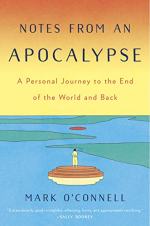|
This section contains 539 words (approx. 2 pages at 400 words per page) |

|
Notes From an Apocalypse Summary & Study Guide Description
Notes From an Apocalypse Summary & Study Guide includes comprehensive information and analysis to help you understand the book. This study guide contains the following sections:
This detailed literature summary also contains Topics for Discussion on Notes From an Apocalypse by Mark O'Connell.
The following version of this book was used to create this study guide: O’Connell, Mark. Notes from an Apocalypse. New York: Doubleday, 2020.
In Notes from an Apocalypse, Irish writer Mark O’Connell explores modern fears related to the end of the world. In Chapter 1, O’Connell explores his own apocalypse-related anxieties. He explains that his motivation for this book was to gain a better perspective of the world, and to possibly learn more about himself along the way. To research this book, he traveled to many different parts of the world and interacted with many different people.
In Chapter 2, O’Connell summarizes research that he conducted into modern ‘doomsday preppers,’ who are people that prepare for various apocalyptic scenarios. O’Connell found that many of these people are white American men who live in rural areas and have right-wing political views. O’Connell describes the misogyny, racism, and distrust of modern society held by many of these men.
In Chapter 3, O’Connell recounts a trio he took to South Dakota. There, he met with Robert Vicino, the owner of a company called Vivos. Vivos builds luxury apocalypse shelters for wealthy buyers. O’Connell describes Vicino as being generally unpleasant. Moreover, O’Connell articulates several practical and moral objections so companies like Vivos, as they are essentially manifestations of selfishness and economic divisions.
In Chapter 4, O’Connell discusses the country of New Zealand, which he visited while doing research for this book. Specifically, O’Connell addresses the modern phenomenon of billionaires buying land in New Zealand, with the intention of building their own private apocalypse shelters there. O’Connell critiques the selfish views held by such people, and he argues that wealth would be better spent in ecological research and preservation.
In Chapter 5, O’Connell critiques growing Corp are control of space travel. O’Connell uses Elon Musk’s company SpaceX as a primary example. O’Connell critiques plans of ‘colonizing’ Mars, and he argues that effort and resources would be better spent if they were devoted to reservation and healing Earth’s environment.
In Chapter 6, O’Connell articulates the connections between capitalism, consumerism, and ecological decline. In order to feel closer to nature, he went on multiple wilderness journeys. He felt that, to some degree, those experiences helped him feel a greater sense of connection with nature. He argues that humans should try to stop thinking of themselves as separate from nature.
In Chapter 7, O’Connell recounts a trio he took to the country of Ukraine. He visited the Chernobyl Exclusion Zone, which was the site of the Chernobyl nuclear disaster of 1986. In reference to this trio and his observations there, O’Connell considers idea about nature, humanity, technology, and subjects.
In Chapter 8, O’Connell ends the book on a fairly hopeful note. He feels that his explorations have helped him gain a better perspective on the world and on his own anxieties. He realizes that anxieties are connected in large part to the fact that the world still contains much unnecessary suffering, such as created by economic inequality. He resolved to continue the fight for economic and ecological justice, but he also resolved to enjoy the good things in his life, such as his family.
Read more from the Study Guide
|
This section contains 539 words (approx. 2 pages at 400 words per page) |

|



